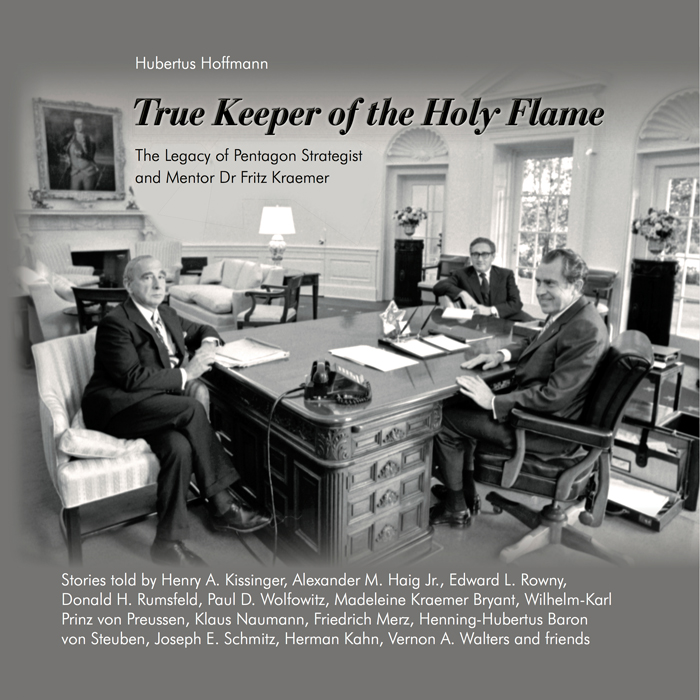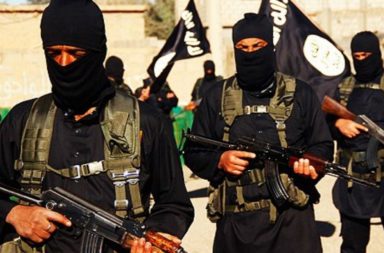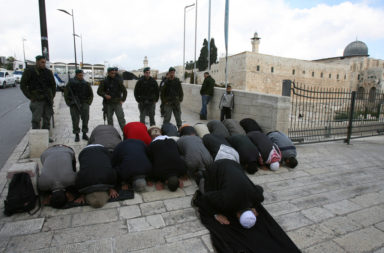Still no peace in the Holy Land for Christmas and the Holiday Season 2016.
Even more signals of confrontation in 2017.
“Peace to the women and men of the beloved Holy Land, the land chosen and favoured by God. May Israelis and Palestinians have the courage and determination to write a new page of history, where hate and revenge give way to the will to build together a future of mutual understanding and harmony.”
Too many hawks – very few peace doves in the Holy Land – on both sides.
President-elect Trump supports Israel under all conditions.
- He nominated David Friedman, a right-wing sponsor of Israel’s illegal settlement enterprise, to serve as US ambassador to Israel.
- Trump wants to transfer the American Embassy to Jerusalem as one capital of Israel.
- He supports a Great Israel including the occupied West Bank with unlimited new settlements leaving the Palestinians few room to live in their country.
- He asked the Obama administration to veto the latest UN Security Council resolution 2334 in December 2016 and promised to veto such resolution in the future.
- Trump is the dream-come-true of all hardliners.
Israel’s government wants it all for Israel: all land including East Jerusalem and the West Bank and a kind of ‘peace’ with the millions Arabs living there as well and a pure Jewish state. Is this naive and counterproductive or possible long term?
Just before the holiday season 2016 the Obama administration allowed the United Nations Security Council to adopt a resolution that condemned Israeli settlement construction.
No veto by the US administration shows a lot of frustration over Israeli settlements.
Here the text and arguments of the UN Security Council resolution number 2334 (2016) from December 23, 2016:
“The Security Council,
“Reaffirming its relevant resolutions, including resolutions 242 (1967), 338 (1973), 446 (1979), 452 (1979), 465 (1980), 476 (1980), 478 (1980), 1397 (2002), 1515 (2003), and 1850 (2008),
“Guided by the purposes and principles of the Charter of the United Nations, and reaffirming, inter alia, the inadmissibility of the acquisition of territory by force,
“Reaffirming the obligation of Israel, the occupying Power, to abide scrupulously by its legal obligations and responsibilities under the Fourth Geneva Convention relative to the Protection of Civilian Persons in Time of War, of 12 August 1949, and recalling the advisory opinion rendered on 9 July 2004 by the International Court of Justice,
“Condemning all measures aimed at altering the demographic composition, character and status of the Palestinian Territory occupied since 1967, including East Jerusalem, including, inter alia, the construction and expansion of settlements, transfer of Israeli settlers, confiscation of land, demolition of homes and displacement of Palestinian civilians, in violation of international humanitarian law and relevant resolutions,
“Expressing grave concern that continuing Israeli settlement activities are dangerously imperilling the viability of the two-State solution based on the 1967 lines,
“Recalling the obligation under the Quartet Roadmap, endorsed by its resolution 1515 (2003), for a freeze by Israel of all settlement activity, including “natural growth”, and the dismantlement of all settlement outposts erected since March 2001,
“Recalling also the obligation under the Quartet roadmap for the Palestinian Authority Security Forces to maintain effective operations aimed at confronting all those engaged in terror and dismantling terrorist capabilities, including the confiscation of illegal weapons,
“Condemning all acts of violence against civilians, including acts of terror, as well as all acts of provocation, incitement and destruction,
“Reiterating its vision of a region where two democratic States, Israel and Palestine, live side by side in peace within secure and recognized borders,
“Stressing that the status quo is not sustainable and that significant steps, consistent with the transition contemplated by prior agreements, are urgently needed in order to (i) stabilize the situation and to reverse negative trends on the ground, which are steadily eroding the two-State solution and entrenching a one-State reality, and (ii) to create the conditions for successful final status negotiations and for advancing the two-State solution through those negotiations and on the ground,
“1. Reaffirms that the establishment by Israel of settlements in the Palestinian territory occupied since 1967, including East Jerusalem, has no legal validity and constitutes a flagrant violation under international law and a major obstacle to the achievement of the two-State solution and a just, lasting and comprehensive peace;
“2. Reiterates its demand that Israel immediately and completely cease all settlement activities in the occupied Palestinian territory, including East Jerusalem, and that it fully respect all of its legal obligations in this regard;
“3. Underlines that it will not recognize any changes to the 4 June 1967 lines, including with regard to Jerusalem, other than those agreed by the parties through negotiations;
“4. Stresses that the cessation of all Israeli settlement activities is essential for salvaging the two-State solution, and calls for affirmative steps to be taken immediately to reverse the negative trends on the ground that are imperilling the two-State solution;
“5. Calls upon all States, bearing in mind paragraph 1 of this resolution, to distinguish, in their relevant dealings, between the territory of the State of Israel and the territories occupied since 1967;
“6. Calls for immediate steps to prevent all acts of violence against civilians, including acts of terror, as well as all acts of provocation and destruction, calls for accountability in this regard, and calls for compliance with obligations under international law for the strengthening of ongoing efforts to combat terrorism, including through existing security coordination, and to clearly condemn all acts of terrorism;
“7. Calls upon both parties to act on the basis of international law, including international humanitarian law, and their previous agreements and obligations, to observe calm and restraint, and to refrain from provocative actions, incitement and inflammatory rhetoric, with the aim, inter alia, of de-escalating the situation on the ground, rebuilding trust and confidence, demonstrating through policies and actions a genuine commitment to the two-State solution, and creating the conditions necessary for promoting peace;
“8. Calls upon all parties to continue, in the interest of the promotion of peace and security, to exert collective efforts to launch credible negotiations on all final status issues in the Middle East peace process and within the time frame specified by the Quartet in its statement of 21 September 2010;
“9. Urges in this regard the intensification and acceleration of international and regional diplomatic efforts and support aimed at achieving, without delay a comprehensive, just and lasting peace in the Middle East on the basis of the relevant United Nations resolutions, the Madrid terms of reference, including the principle of land for peace, the Arab Peace Initiative and the Quartet Roadmap and an end to the Israeli occupation that began in 1967; and underscores in this regard the importance of the ongoing efforts to advance the Arab Peace Initiative, the initiative of France for the convening of an international peace conference, the recent efforts of the Quartet, as well as the efforts of Egypt and the Russian Federation;
“10. Confirms its determination to support the parties throughout the negotiations and in the implementation of an agreement;
“11. Reaffirms its determination to examine practical ways and means to secure the full implementation of its relevant resolutions;
“12. Requests the Secretary-General to report to the Council every three months on the implementation of the provisions of the present resolution;
“13. Decides to remain seized of the matter.”
What does this mean?
- Under international law occupation forces are not allowed to take over the land and build settlements- this is the consensus of legal experts and the position of the US, the EU and almost all other countries in the 195 member United Nations.
- While Russia is blamed to annex Crimea by the US and the EU, the same is done with settlements in the occupied West Bank. Trump wants a u-turn pro Israel.
- The American abstention on the vote in the security council of the United Nations broke the policy of shielding Israel from action at the United Nations under all conditions.
- The Obama administration is since years critical of Israel’s settlement building, describing it as an impediment to a two-state solution in the Israeli-Palestinian conflict that has long been the official United States position.
- Ms Powers, the US ambassador to the UN told: “Today the Security Council reaffirmed its established consensus that settlements have no legal validity. The United States has been sending a message that settlements must stop privately and publicly for nearly five decades.”
- The resolution condemned Israeli housing construction in East Jerusalem and the occupied West Bank as a “flagrant violation under international law” that was “dangerously imperiling the viability” of a future peace settlement establishing a Palestinian state.
- The 15-member Security Council voted on the measure, which passed 14 to 0, with the United States ambassador, Samantha Power, raising her hand as the lone abstention.
- Prime Minister Benjamin Netanyahu of Israel reacted agry: “Israel rejects this shameful anti-Israel resolution at the U.N. and will not abide by its terms. At a time when the Security Council does nothing to stop the slaughter of half a million people in Syria, it disgracefully gangs up on the one true democracy in the Middle East, Israel, and calls the Western Wall ‘occupied territory.’ ”
- Mr. Netanyahu immediately ordered Israel’s ambassadors to New Zealand and Senegal to return home for consultations, canceled a planned visit to Israel next month by Senegal’s foreign minister and cut off all aid programs.
- Mr. Trump urged the administration to veto the resolution. In a Twitter posting, saying: “As to the U.N., things will be different after Jan. 20th.”
- Senator Lindsey Graham of South Carolina threatened to take steps that could “suspend or significantly reduce” that financing..
Lets have a closer look into the peace-options for the Holy Land.
In 2016 Shimon Peres passed away. He was Mr. Israel.
He was awarded the Nobel Peace Prize for the Oslo Peace process.
We last met in his residence in Jerusalem (picture) and during the visit of Pope Francis in the Holy Land in June 2014.
What is the peace legacy of Shimon Peres (1923-2016)?
He had a unique career: once president (2007-2014), three times prime minister (1977, 1984 and 1995), three times foreign minister (1986-1988;1992-1995 and 2001-2002), as well as two times defense minister (1974-1977 and 1995-1996), and minister of finance and transportation as well.
Peres was the main man behind Israel’s top secret atomic bomb program, as early as 1957, supported by France.
He came to this land with his family as a poor refugee from Poland, born 1923. Here with his large family in 1930, standing third from right side.
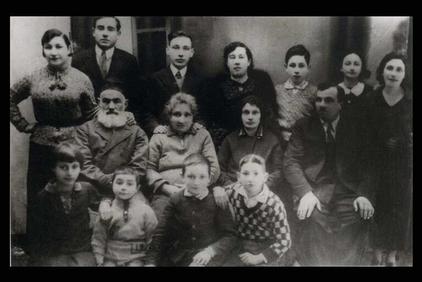
Shimon Peres started as a hawk and became a dove.
He was awarded the Nobel Peace Prize together with his friend Yitzhak Rabin and his arch-enemy Yasser Arafat for the mutual agreed Oslo Peace agreement in 1994.
The prize was, as the chairman of the Nobel Committee Francis Sejersted pointed out, “awarded both in recognition of efforts which have been made, and to encourage still further efforts”.
“Peres is the last of the three to pass away. Now, it is up to others to continue the work for peace in the Middle East, and fulfill Peres’ goal of a Middle East «in which men are each other’s hosts, not hostages”, the Nobel Peace Prize Institute in Oslo wrote.
He became a man of peace-making, because as a soldier he knew too well what war means.
21 years after the assassination of Yitzhak Rabin, his Oslo peace process is dead.
New riots in Jerusalem and the West Bank.
New settlements in the West Bank.
Hard liners prevail, hawk and no doves left. On both sides.
Which is best described by famous Hillel the Elder in one sentence: “That which is hateful to you, do not do to your fellow. That is the whole Torah; the rest is the explanation; go and learn!” (Sabbat 31a)
The death of Shimon Peres should us all remember his vision for Israel, Palestine and the Holy Land and the goal of Hillel the Elder:
A fresh start is required now more than ever. For Israel and for Palestine.
The official end of the hopes from Oslo and killings in Jerusalem once again tells us, what to do now to reach peace in the Holy Land.
My World Security Network has been proposing for many years for Israel/Palestine:
The unsettled and explosive situation throughout the entire Middle East; radical forces in the Gaza Strip and in Lebanon, now strong ISIS terrorists in Syria and Iraq. Iraq worse than before the US invasion in 2003. Tehran’s influence strong next door, still flirting with the bomb.
These examples show that the old peace strategies and concepts of Israel, the U.S., and the EU have all failed in this important region of the world. It is time for a U-turn in foreign policy and a fresh active peace strategy according to our approach, World 3.0.
Israel, the United States and and the European countries urgently need a credible, realistic, and promising New Peace Double Strategy. They should learn from the many mistakes and illusions of the past and follow a dual track of hawk and dove; a promising double approach of Uzi – the famous Israeli sub machine-gun – and olive branch, of deterrence and reconciliation.
Peace is possible
Despite current setbacks – the power gains of radical forces and many negative television images – viewed in a historical context, peace is possible between Jews and Arabs.
The history of Europe proves this. Centuries-old ancestral animosities have been transformed into friendships, for example between Germany and its two largest neighbors France and Poland. At least with its neighbors Egypt and Jordan, Israel has already found a way to coexist. It had good relations with Turkey – ruined by the isolation of the Gaza strip- and has even improved relations with Saudi Arabia through cooperation behind closed doors. Real peace, however, must be “actively created”, as so appropriately stated by Immanuel Kant.
True peace requires common values and interests, and parallel political goals. It also needs government mandated, mutually desired reconciliation between peoples. Peace politics needs immense patience and daily efforts over many years. It must be able to withstand numerous setbacks and disappointments.
Israel, Palestine and its Arab neighbors now need common values, interests, and goals
According to the principles of the UN charter and the values of the U.S., Europe, Israel, and progressive movements in the Middle East, common values in the Middle East can only exist within universal, liberal democratic principles. This is the opposing model to the totalitarian beliefs of Hamas, the Hezbollah, IS or the Iranian government.
The common interest of Israel and its Arab neighbors and the majority of the Arab people is containment and neutralization of the Islamic totalitarian threat. This threat is life endengaring to all Arab governments and the silent majority of Western-oriented populations, including important states like Lebanon, Egypt, Jordan, Saudi Arabia, and the prosperous Gulf States like Qatar.
Important common interests could also develop from expanded economic cooperation, above all between Israel, Palestine, and their neighbors Egypt and Lebanon. Necessary to reduce regional youth unemployment, it offers hope for a better future.
One possible goal of a new Middle East peace politics could be the creation of an economically flourishing, free and prosperous free trade zone in association with the European Union. This would extend from Lebanon through Palestine; from Israel to Egypt and Jordan to the traditional Holy Land. The EU should begin concrete, intensive work on this long term goal and not wait until all border conflicts have been resolved. Just to send a team of policemen to Gaza, is far from enough.
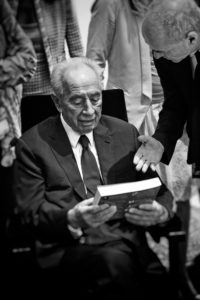
Photo: In the Presidential Residence in Jerusalem in June 2014, Globalo Founder Dr Hubertus Hoffmann presented Israel’s President Shimon Peres his biography about his mentor for 25 years, Dr. Fritz Kraemer (True Keeper of the Holy Flame. The Legacy of Pentagon Strategist and Mentor Dr. Fritz Kraemer). This Prussian emigrant from Germany became the iron mentor of young Henry Kissinger and Alexander Haig and a legendary Pentagon advisor. His father, first prosecutor and major in reserve Dr. Georg Kraemer, a converted Lutheran from Koblenz in Germany, was deported July 27 and died in KZ Theresienstadt November 1, 1943, due to his long time Jewish family background under Nazi law.
A new olive branch policy of reconciliation is a matter of survival for Israel
Israel’s military responses to riots in Jerusalem, the West Bank or Hamas’s rocket from Gaza and any terrorist can only prevent attacks on Israeli territory for a limited time. It cannot bring about lasting peace. It even produces more and more hate and fighters with rockets and stones.
Israel’s policy toward its neighbors is lacking, perhaps and fatally so, the common element in successful peace politics: reconciliation. This is the Achilles heel of the government which in fact has no idea how to accomplish real peace; some elements even want to expand Israel from the borders of 1967 to a Greater Israel including the West Bank. The Palestinians are more seen as trouble makers to contain than partners of peace. But many more radicals like IS will soon knock at the door of Israel and the states around may collapse. Look at Syria, Lebanon or Jordan.
Israel needs – in the interests of its own survival – a new peace policy consisting of the “Uzi and the olive branch”: a credible double strategy of reconciliation on the one hand, and deterrence through both military operations against terror organizations and conventional and nuclear weapons on the other. There is no other way to make Israel safer.
The historical formula for Israel’s survival, surrounded as it is by hostile countries and the threat of Iran-sponsored terrorism, is the “hawk plus dove”. The hawk alone does not bring peace.
In the next one hundred years, Israel will only be able to survive in its historic location, surrounded by a numerically superior enemy rich with petrodollars, frustrated Palestinians and radical fighter, when it places reconciliation with its Arab neighbors as “conditio sine qua non” of a genuine Israeli peace policy, and supports reconciliation with just as much energy, imagination, patience, and money as the necessary but insufficient military operations against terrorists.
Israel needs a reconciliation offensive to supplement the necessary traditional military and power politics. Until now the government does nothing for reconciliation. Thus the radicals will win in waves of hate again and again.
Only a genuine, interpersonal policy of reconciliation can instigate real peace in the Middle East and lay the foundation for eternal peace between Jews and Arabs, who already live well together in Israel.
Active power politics, be it the targeted killing of terrorists or the invasion and bombing of Lebanon or Gaza, only bring about a limited tactical advantage and not a lasting peace.
Passive power politics by means of conventional or nuclear deterrents can only prevent the utilization of those same weapons by an enemy army for a while. It cannot prevent the asymmetrical warfare of terrorists—the real threat to Israel.
Power politics is the necessary complement to peace politics. Alone, however, it is insufficient for the security and peace of Israel.
In other words, Israel needs a new peace policy, which is credible externally, consisting of “a thinking heart” and a “loving mind”. This was how the Catholic Archbishop of Opole, Alfons Nossol, described from his experience, the difficult reconciliation between Germans and Poles from 1945 to 1990.
In Israel, the roots of this Olive Tree of Peace have long since been neglected due to understandable frustration, assassinations, and a bunker mentality influenced by Old Testament thinking (“eye for an eye, tooth for a tooth”). The Tribe of Israel’s tree of peace has been dying slowly for many years.
Can Israel afford this?
One of the most intelligent societies in the world threatens to fall into the trap of its deadliest enemy. An active policy of reconciliation would work like an antidote against the hostile propaganda of Hamas, the Hezbollah, and the arch enemies in Damascus and Tehran or IS. Only this would make lasting peace for the children of Israel possible.
Reconciliation politics are the only credible way to publicly document that Israel is not the aggressor, but has acted in self-defense. Israel needs the sympathy of the world; Hamas and the Hezbollah need only money and weapons from Iran and hate-filled, young suicide bombers.
Reconciliation is the only effective method to drain the swamp of suicide bombers. It can put a stop to the perpetual motion machine of hatred, violence, and retribution.
Coming to terms with expelled Palestinians
If it is correct that true peace requires real reconciliation, Israel must aggressively pursue coming to terms with the Palestinians expelled from its territory and to reach out the hand of reconciliation to this group in self-interest. Only in this way is reconciliation credible and can Israel win the peace.
To this end, Israel can draw from European “best practices”. There, millions of people were driven from their homelands following WWII, including twelve million Germans in the East, among them my own parents. They were peacefully integrated into their new country and made lasting peace in Europe possible through reconciliation and the renunciation of violence and a return home.
A double strategy of power and reconciliation is needed
The old fundamental belief, that the return by Israel of the occupied territories through a just treaty would result in a long-desired peace, has failed spectacularly. The release of the Gaza Strip in 2005—regrettably without the necessary and meaningful inclusion of positive reconciliation with the Palestinians —has not resulted in an increase in security, but has produced a vacuum filled by the radical Hamas. This step is both useless and counterproductive. It derives from the misguided planning and assumptions of the White House and the Israeli government under hawkish Ariel Sharon, who never understood that peace means reconciliation with your former enemies. Hamas and its supporters in Tehran are not just concerned with borders, but the total destruction of Israel and its power in the Middle East. Many millions of people throughout the Middle East sympathize with this goal.
Israel is at a crossroads again: Do they lose one friend after another – including the U.S. and many European countries which are frustrated with the bombing of even UN schools in Gaza – or start a new way of thinking, a new double strategy of power and reconciliation. Israel is in danger. It can win a tiny war in Gaza, but loose the big battle and its fundament.
It has existed only for 60 years; the Crusaders lasted 200 years even while their Kingdom of Jerusalem gradually reduced from 1099 to 1291, with Jerusalem lost in 1187 to Saladin.
The Israeli government of Benjamin Netanyahu is leading the people deeper and deeper along a dead end road of confrontation, promoting more and more hate on the side of the frustrated Palestinians.
The same happened with the Crusaders in the 12th century: after many years of peaceful co-existence came radical and confrontational leaders like Guy of Lusignam and Raynold of Chatillon – along with death and destruction. The Crusaders never understood the art of peace-making.
For too long Israel has been held hostage by the nationalist wings in its politics and the settlers in the West Bank, allies of Prime Minister Netanyahu, and its traditional bunker mentality. In reality, Israel has no strategy but a pragmatic show of strength. It is about to lose the battle for its existence in the long-term. Israel is only focused on the hard factors of peace-making, like killing enemies and containment.
It lacks the more important soft factor of peace-making: a reconciliation process with the Palestine people, a new détente with the Arab world. This would not be weakness, but cleverness and necessity. Or as Eric Hoffer once said: “A war is only won after you have turned your enemy into a friend.” Israel should carefully plan and implement a new reconciliation policy with the Palestinians as an equally important pillar of its security. It needs a fresh new double strategy of hawk and dove, uzi and olive branch.
New settlements in occupied territories are not in the security interests of Israel as they produce not peace but more hate. Israel should reduce them to a minimum around Jerusalem like in the 1980th.
No wonder the new Gaza-war started in Hebron. When in February 2010 the Israeli government included the grave of Abraham – Ibrahim to Arabs – in the Palestinian city of Hebron on the list of “Israeli national heritage sites” this was not only a clear violation of international law but also suicidal against Israeli national interests as it poisoned the weak tree of peace in the Holy Land.
Abraham is the forefather of both Jews and Arabs and should never be exclusively claimed for only one religion and one state. For 3,800 years he has stood above the state and Israel must respect this.
In Hebron the peace process is being hijacked by merely 700 Israeli settlers living in an enclave of 170,000 Palestinians, where violence has been inflicted by both sides for decades. The shameful killing of the three Jewish teenagers June 12, 2014 was most probable organized in Hebron, including the involvement of the radical Qawasameh clan. This holy city should be a center of reconciliation and not hate. Israel should start now.
Israel and the world have to stop the radicals on both sides, and give peace a chance – now.
To date, Israel and the U.S. lack any promising double strategy of power and reconciliation, the Uzi and the olive branch, hawk and dove. Only through such a double strategy was NATO able to neutralize the threat of the Warsaw Pact. NATO’s strategy was spelled out in the 1967 Harmel Report: a dual approach of defensive capability and détente. Only through the NATO double track decision of 12 December 1979 could the nuclear threat to Western Europe by Russian SS-20 rockets be eliminated through an arms build-up consisting of Pershing II and Cruise missiles and the offer of an arms control agreement, the so called Zero-Option. These were spectacular winning strategies on the part of the West in Europe, towards an overwhelming threat. These strategies are also valid in the Middle East.
The hawk ensures that Israel is neither threatened by nuclear or conventional weapons and is able to at least constrain terrorism. These self-defense measures are not only necessary but also guaranteed by the UN Charter. Israel needs a strong military now as ever.
As a hare waits for the snake, Israeli governments have waited so long for a “just” peace agreement between neighbors, above all with the Palestinians. This has seemed unachievable for decades.
Israel has quite simply built its peace policy on the wrong foundation and on an error: first strength, then successful negotiations.
A single-minded policy of strength on the part of Israel seems to offer little hope given current realities and trends: Mission Impossible.
Worse still, the one-sided policy oriented toward the hawk has brought more and more enemies with it and left behind the few who were understanding and sympathetic. As a result, it is the radical Israel-haters who have been strengthened, not the peacemakers.
Israel must plant an olive tree for peace, tend to it and develop and implement a credible double strategy of the Uzi and the olive branch, hawk and dove. This must become the primary task of Israeli, American and European Middle Eastern policy today.
What does this double strategy look like in detail?
Summits, high-level meetings, and conferences are necessary but are often self-deceiving mirages lacking long-lasting substance. This can be seen on hundreds of past occasions. They only make sense following a long term, successful implementation of a double strategy reaching the minds and hearts of the Palestinians and other Arab neighbors.
Israel must, of its own volition, extend the hand of reconciliation to the Palestinians with a thousand concrete gestures. This new Israeli strategy must credibly document the will to work towards peaceful cooperation and reconciliation. The new political leaders must come out in favor of this.
Here are but a handful of examples of the hundreds of small and medium sized steps which could be taken to promote reconciliation – implementing olive branch and dove – between Israel and its Arab neighbors. Here some first ideas for the implementation:
- Appointment of a new cabinet member responsible solely for the reconciliation policy of the Israeli government focused on the Palestinian Authority and Lebanon. The position must come with its own staff and a large budget. Otherwise this important pillar will be buried, as now, in the standard procedures of other ministries.
- A fundamental report on all best practice examples by the government taking advantage of the thousands of grassroots projects of peace movements like One Voice, who have enormous knowledge and networks and a focus on fast track actions and longer term recommendations.
- An annual Tolerance Report to Parliament by the government on the progress of reconciliation, as done in many countries on arms control and environmental protection. An Ombudsman of the Parliament collecting all complaints of Palestinians and others and attempts to resolve them.
- A release policy of Palestinian prisoners, who have no blood on their hands. This would be best combined with an official “let’s turn enemies into friends now!” campaign of the Israel government combined with an amnesty for crimes less serious than planning deadly attacks.
- Israel should finance a USD 5 billion Israel Reconciliation Fund which could finance the equipping of several hospitals, schools, and kindergartens in Palestinian areas including Gaza with, for example, the financial support of Washington and Brussels.
- Improving the economy with the Palestinian Authority: for example smoothing the flow of goods like flowers or fruits from Palestine to Europe to stimulate youth employment.
- A USD 10 billion Palestine Fund which would compensate Palestinian families for the loss of their land. After fifty years, a similar structure has been set up by the German Government and German industry to compensate WWII slave workers, whence more than 1.5m people received USD 7 billion within two years.
- Several Joint Action Committees in all major areas of politics with the PA, including economic cooperation, customs, prisoner exchange, and internal prevention of suicide attacks.
- One key area of cooperation is media and education. A joint School Book Committee should steer a path away from teaching hate. Best practices examples are the very successful common schoolbook commissions set up by former enemies Germany, France, and Poland.
- Cash release for the Palestinian Authority to fund rebuilding in the West Bank and reduce the high unemployment there.
- Members of the Israeli government should invite their Palestinian counterparts for round table discussions and private reconciliation dinners to develop personal relationships and trust.
- Establishment of an Israel-Palestine Truth and Reconciliation Commission as successfully set up in South African after the end of apartheid in 1995. The mandate of the commission was to bear witness to, record and in some cases grant amnesty to the perpetrators of crimes relating to human rights violations, reparation and rehabilitation, especially organizing suicide attacks and human rights violations against the Palestinians. Anybody who felt he had been a victim of violence could come forward and be heard at the TRC. Perpetrators of violence could also give testimony and request amnesty from prosecution.
- All conceivable humanitarian gestures should be realized in one wave starting with first actions soon. In other words, Israel should begin a reconciliation offensive on the level of the Yom Kippur offensive. It should strive to win over the hearts and the hopes of moderate Palestinians who have grown tired of murder and unemployment.
- Alongside the Camp David proposals of former Prime Minister Ehud Barak from 2000, Israel should develop an overall plan for a new ordering of its borders. Within this scheme, the centre of Jerusalem could be entrusted to the care of UNESCO as a world heritage site. The administration would be determined in a treaty between Israel and Palestine. The settlements in the West Bank should be reduced to a minimum and the border wall torn down after assassinations have substantially declined.
Palestine, the West Bank and Gaza
Gaza and the West Bank need a fresh political leader. A politician who is credible, who has neither stolen public money nor is focused on killing civilians but can give the Holy Land a Holy Plan for a better future now. His legitimacy must come out of a credible fresh campaign. Palestine needs a Third Force, a fresh young democratic party, which is neither the grey-haired bureaucrats of Fatah who lost credibility in past, nor the Hamas totalitarian bureaucrats with their narrow-minded black and white world view and no track record in human rights and a better economy or life. There are several Palestinians outside Palestine who would fit this job description and could do the patriotic job for their land and their people. We have to find them now and support their rapid rise to power, backed by the majority of now hopeless young people in Palestine. The slogan could be “Jobs, Freedom and Future for the People” – something Hamas cannot offer at all.
To prepare the soil for such a new Palestinian leader and new democratic organization and election campaign you need time and a mood of the people to accept a positive image for their future, a choice between Katyusha and jobs, between al-Qassam missiles and kindergartens and schools. Israel needs desperately not only battle plans for wars but also battle plans for reconciliation. The well-being of the people in Gaza is in favor of that new peace strategy and not the opposite.
The Palestine Authority must make much clearer that the killing of civilians and the bombing from Gaza of Israel is illegal under the rules of Jihad and Islamic law which never allows the killing of civilians but only the direct attacker in self-defense. The PA must stop its perverse hate-propaganda and turn to reconciliation as well.
But Israel should not wait.
It must start its own policy of reconciliation now or it will lose the Big War.
This is the real task for Mr. Trump. Let us hope he and his team understands it.
